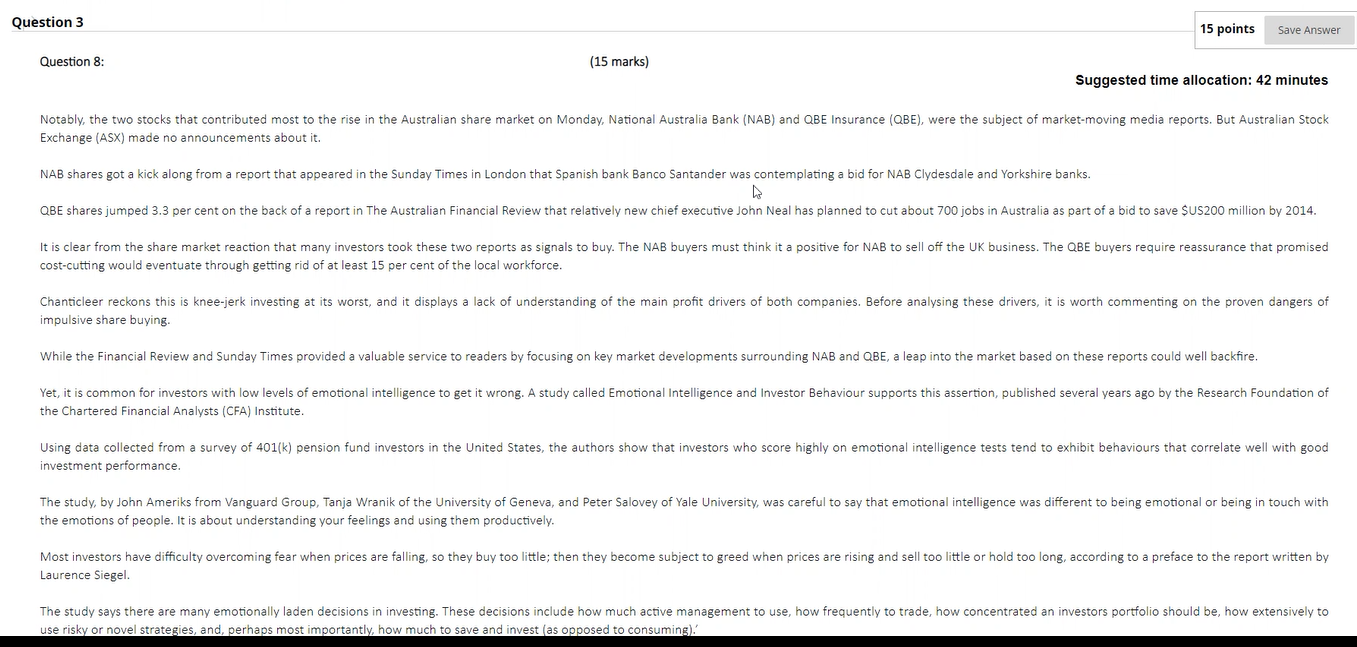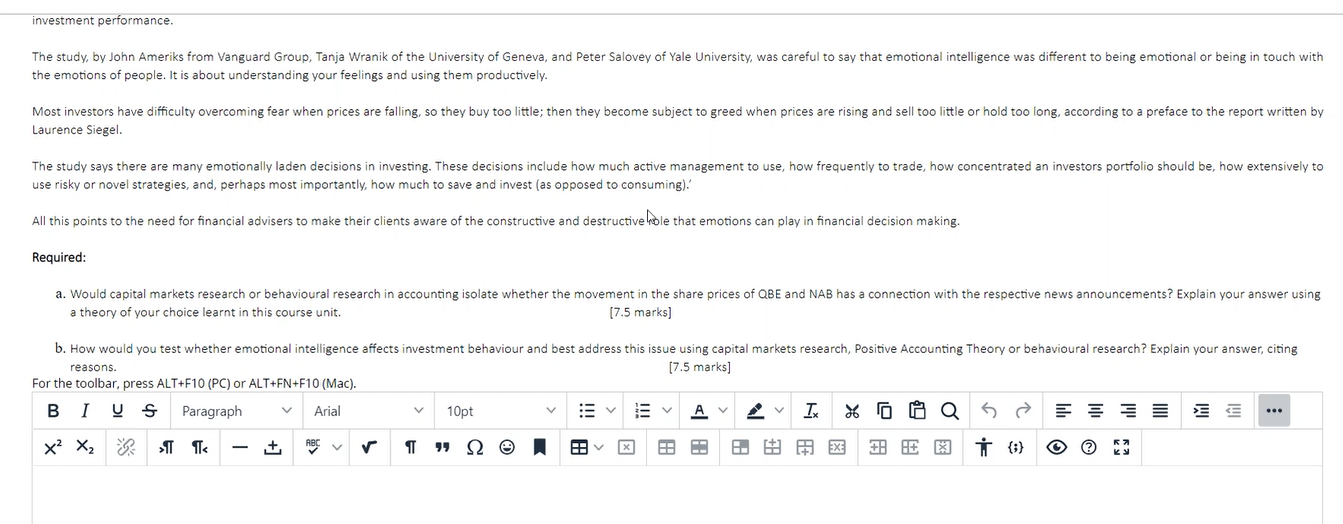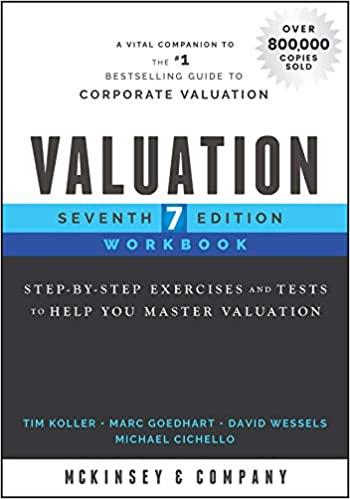

Question 3 15 points Save Answer Question 8: (15 marks) Suggested time allocation: 42 minutes Notably, the two stocks that contributed most to the rise in the Australian share market on Monday, National Australia Bank (NAB) and QBE Insurance (QBE), were the subject of market-moving media reports. But Australian Stock Exchange (ASX) made no announcements about it. NAB shares got a kick along from a report that appeared in the Sunday Times in London that Spanish bank Banco Santander was contemplating a bid for NAB Clydesdale and Yorkshire banks. QBE shares jumped 3.3 per cent on the back of a report in The Australian Financial Review that relatively new chief executive John Neal has planned to cut about 700 jobs in Australia as part of a bid to save $US200 million by 2014. It is clear from the share market reaction that many investors took these two reports as signals to buy. The NAB buyers must think it a positive for NAB to sell off the UK business. The QBE buyers require reassurance that promised cost-cutting would eventuate through getting rid of at least 15 per cent of the local workforce. Chanticleer reckons this is knee-jerk investing at its worst, and it displays a lack of understanding of the main profit drivers of both companies. Before analysing these drivers, it is worth commenting on the proven dangers of impulsive share buying. While the Financial Review and Sunday Times provided a valuable service to readers by focusing on key market developments surrounding NAB and QBE, a leap into the market based on these reports could well backfire. Yet, it is common for investors with low levels of emotional intelligence to get it wrong. A study called Emotional Intelligence and Investor Behaviour supports this assertion, published several years ago by the Research Foundation of the Chartered Financial Analysts (CFA) Institute Using data collected from a survey of 401(k) pension fund investors in the United States, the authors show that investors who score highly on emotional intelligence tests tend to exhibit behaviours that correlate well with good investment performance. The study, by John Ameriks from Vanguard Group, Tanja Wranik of the University of Geneva, and Peter Salovey of Yale University, was careful to say that emotional intelligence was different to being emotional or being in touch with the emotions of people. It is about understanding your feelings and using them productively. Most investors have difficulty overcoming fear when prices are falling, so they buy too little; then they become subject to greed when prices are rising and sell too little or hold too long, according to a preface to the report written by Laurence Siegel. The study says there are many emotionally laden decisions in investing. These decisions include how much active management to use, how frequently to trade, how concentrated an investors portfolio should be, how extensively to use risky or novel strategies, and perhaps most importantly, how much to save and invest (as opposed to consuming) investment performance. The study, by John Ameriks from Vanguard Group, Tanja Wranik of the University of Geneva, and Peter Salovey of Yale University, was careful to say that emotional intelligence was different to being emotional or being in touch with the emotions of people. It is about understanding your feelings and using them productively. Most investors have difficulty overcoming fear when prices are falling, so they buy too little; then they become subject to greed when prices are rising and sell too little or hold too long, according to a preface to the report written by Laurence Siegel. The study says there are many emotionally laden decisions in investing. These decisions include how much active management to use, how frequently to trade, how concentrated an investors portfolio should be, how extensively to use risky or novel strategies, and, perhaps most importantly, how much to save and invest (as opposed to consuming). All this points to the need for financial advisers to make their clients aware of the constructive and destructive hole that emotions can play in financial decision making. Required: a. Would capital markets research or behavioural research in accounting isolate whether the movement in the share prices of QBE and NAB has a connection with the respective news announcements? Explain your answer using theory of your choice learnt in this course unit. [7.5 marks] b. How would you test whether emotional intelligence affects investment behaviour and best address this issue using capital markets research, Positive Accounting Theory or behavioural research? Explain your answer, citing reasons. [7.5 marks] For the toolbar, press ALT+F10 (PC) or ALT+FN+F10 (Mac). B I y S Paragraph Arial 10pt TX % > V X2 X2 Els + HBE T " 2 ~ x HA :} Question 3 15 points Save Answer Question 8: (15 marks) Suggested time allocation: 42 minutes Notably, the two stocks that contributed most to the rise in the Australian share market on Monday, National Australia Bank (NAB) and QBE Insurance (QBE), were the subject of market-moving media reports. But Australian Stock Exchange (ASX) made no announcements about it. NAB shares got a kick along from a report that appeared in the Sunday Times in London that Spanish bank Banco Santander was contemplating a bid for NAB Clydesdale and Yorkshire banks. QBE shares jumped 3.3 per cent on the back of a report in The Australian Financial Review that relatively new chief executive John Neal has planned to cut about 700 jobs in Australia as part of a bid to save $US200 million by 2014. It is clear from the share market reaction that many investors took these two reports as signals to buy. The NAB buyers must think it a positive for NAB to sell off the UK business. The QBE buyers require reassurance that promised cost-cutting would eventuate through getting rid of at least 15 per cent of the local workforce. Chanticleer reckons this is knee-jerk investing at its worst, and it displays a lack of understanding of the main profit drivers of both companies. Before analysing these drivers, it is worth commenting on the proven dangers of impulsive share buying. While the Financial Review and Sunday Times provided a valuable service to readers by focusing on key market developments surrounding NAB and QBE, a leap into the market based on these reports could well backfire. Yet, it is common for investors with low levels of emotional intelligence to get it wrong. A study called Emotional Intelligence and Investor Behaviour supports this assertion, published several years ago by the Research Foundation of the Chartered Financial Analysts (CFA) Institute Using data collected from a survey of 401(k) pension fund investors in the United States, the authors show that investors who score highly on emotional intelligence tests tend to exhibit behaviours that correlate well with good investment performance. The study, by John Ameriks from Vanguard Group, Tanja Wranik of the University of Geneva, and Peter Salovey of Yale University, was careful to say that emotional intelligence was different to being emotional or being in touch with the emotions of people. It is about understanding your feelings and using them productively. Most investors have difficulty overcoming fear when prices are falling, so they buy too little; then they become subject to greed when prices are rising and sell too little or hold too long, according to a preface to the report written by Laurence Siegel. The study says there are many emotionally laden decisions in investing. These decisions include how much active management to use, how frequently to trade, how concentrated an investors portfolio should be, how extensively to use risky or novel strategies, and perhaps most importantly, how much to save and invest (as opposed to consuming) investment performance. The study, by John Ameriks from Vanguard Group, Tanja Wranik of the University of Geneva, and Peter Salovey of Yale University, was careful to say that emotional intelligence was different to being emotional or being in touch with the emotions of people. It is about understanding your feelings and using them productively. Most investors have difficulty overcoming fear when prices are falling, so they buy too little; then they become subject to greed when prices are rising and sell too little or hold too long, according to a preface to the report written by Laurence Siegel. The study says there are many emotionally laden decisions in investing. These decisions include how much active management to use, how frequently to trade, how concentrated an investors portfolio should be, how extensively to use risky or novel strategies, and, perhaps most importantly, how much to save and invest (as opposed to consuming). All this points to the need for financial advisers to make their clients aware of the constructive and destructive hole that emotions can play in financial decision making. Required: a. Would capital markets research or behavioural research in accounting isolate whether the movement in the share prices of QBE and NAB has a connection with the respective news announcements? Explain your answer using theory of your choice learnt in this course unit. [7.5 marks] b. How would you test whether emotional intelligence affects investment behaviour and best address this issue using capital markets research, Positive Accounting Theory or behavioural research? Explain your answer, citing reasons. [7.5 marks] For the toolbar, press ALT+F10 (PC) or ALT+FN+F10 (Mac). B I y S Paragraph Arial 10pt TX % > V X2 X2 Els + HBE T " 2 ~ x HA :}








